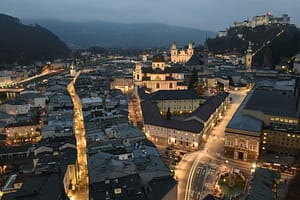The annual cultural events, which reach their peak at the Salzburg Festival, overshadow any after-dark amusements such as dance clubs and beer halls. Clubs come and go in Salzburg fairly rapidly.
It’s said that there’s a musical event — often a Mozart concert — staged virtually every night in Salzburg. To find out what’s playing, visit the Salzburg tourist office, Mozartplatz 5 or get a free copy of Offizieller Wochenspiegel, a monthly pamphlet listing all major and many minor local cultural events; it’s available in most hotels. The annual Mozart Week is in January.
Free concerts are frequently presented by students in the Mozarteum. In summer, free brass-band concerts are performed in the Mirabell Gardens on Wednesday at 8:30pm and, depending on the venue, either Saturday or Sunday at 10:30am; Sunday chamber-music concerts are held throughout the city at major landmarks such as the Residenz.
The second-most famous music festival in Salzburg is the Osterfestspiele (Easter Festival), which features high-quality operas and concerts performed in the Festspielhaus. Some, but not all, of the music focuses on works associated with the resurrection of Christ as interpreted by the great 18th- and 19th-century composers. Established by Herbert von Karajan in the 1960s, the festival requires that spectators purchase tickets to the opera and each of the three concerts associated with the event.
Christmas Eve in Salzburg is unforgettable. Traditionally, in the little chapel of Oberndorf, north of Salzburg, “Silent Night” is performed. Franz Gruber wrote the melody to that song here when he was an organist in the early 19th century.
Curiously, though Salzburg is known as a city of music and culture, it has no famed local troupes. However, it does attract visiting guest artists with blue-chip credentials in the world of performing arts.
The Salzburg Festival
One of the premier music attractions of Europe, the Salzburg Festival celebrates its 87th season in 2007. Composer Richard Strauss founded the festival, aided by director Max Reinhardt and writer Hugo von Hofmannsthal. An annual event is Hofmannsthal’s adaptation of the morality play Jedermann (Everyman), performed in German and staged outside the cathedral in Domplatz. Concerts are usually conducted in the Rittersaal of the Residenz Palace (Mozart conducted here) and in the marble salon of Mirabell Palace (Mozart’s father, Leopold, conducted here).
Festival tickets, however, are in great demand, and there never are enough of them. Don’t arrive expecting to get into any of the major events unless you’ve already purchased tickets. At first-night performances of the major productions, remember that evening dress is de rigueur.
Although the Salzburger Landestheater doesn’t always play for summer visitors, you can see its regular repertoire of operas (not just Mozart) and operettas if you’re in Salzburg from September to mid-June. You might see a thrilling performance of Verdi’s Traviata. Opera tickets usually range from 25€ to 64€ ($40-$102). In July and August, Salzburg Festival performances are held here.
Salzburger Marionetten Theater, presents shows from Easter to September, as well as special shows at Christmas and during Mozart Week, the last week of January. The puppets perform both opera (usually Mozart) and ballet, to the delight of adults and children alike. Founded in 1913, the theater continues to be one of the most unusual and enjoyable theatrical experiences in Salzburg.
The best alternative music spot is Rockhouse which also has a cafe. Local and European bands are booked to play this tunnel-like venue, which offers everything from blues and funk to jazz and techno pop. Sometimes groups from the United States or even Africa appear here. The structure itself is from the 1840s, having once been a wine cellar and ice-storage depot.
There’s something disheveled and disorganized about the Republic Cafe, but it’s a hotbed of countercultural activities in Salzburg. It defines itself as a cross between a bar and a cafe, with a “radical performance space.” Its nerve center is a battered street-level bar and cafe, open Sunday to Thursday from 8am to 1am, Friday and Saturday from 8am to 4pm. You can hang out at the bar, chatting with hard-rock music fans, rave participants, and all kinds of grunge musicians, and ordering mugs of beer costing 3€ to 4€ ($4.80-$6.40). Radiating from the cafe are several performance spaces which might or might not be booked by local jazz ensembles, avant-garde theater groups, performance artists, or nihilist poets, depending on the week’s schedule. Frankly, there’s a lot that’s slipshod and disorganized about this place, but part of its charm derives from a haphazard schedule and its own sense that it’s a cauldron for artistic-statements-in-the-making.

